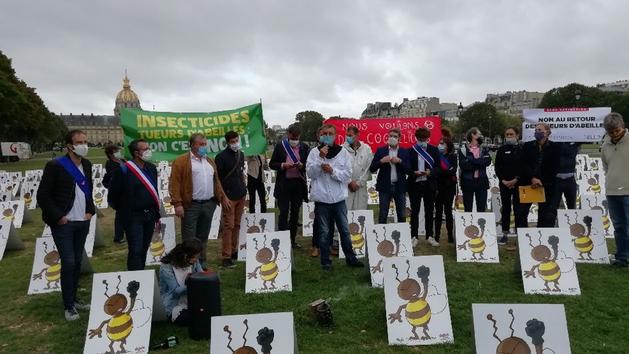While the Economic Affairs Committee of the Palais Bourbon debated this Wednesday a bill re-authorizing neonicotinoid insecticides, more than twenty associations, left-wing parliamentarians and environmentalists expressed their opposition to these chemical treatments agricultural.
They have been prohibited since the Biodiversity law of August 9, 2016, given their dangerousness, in particular on bees.
Gathered on the Esplanade des Invalides around 577 small panels, as many as deputies, representing angry bees with raised fists, some demonstrators waved banners on which one could read "No to the return of the bee killers".
Strong afterglow on the ground
Neonicotinoids are phytosanitary products intended to kill pest insects by intervening on their central nervous system.
They are for example used against aphids which cause yellowing of the leaves of sugar beets.
However, because of their strong persistence in the soil, these treatments produce effects on the crop depending on that for which they were used.
Thus, even after a plantation of beets treated with these products, a field of mustard which produces a flower foraged by bees will contain residues of this insecticide.
Too strong absorption of neonicotinoids by her causes her disorientation and death because she can no longer find her hive.
“We want to challenge each parliamentarian on the heavy responsibility they have in the event of re-authorization of bee-killing insecticides
,” comments Julie Pêcheur, spokesperson for the Pollinis association.
The dangerousness of these chemical treatments has been proven not only for bees but for all wild pollinators and all of biodiversity, 30% of common birds, which feed on these insects, have thus disappeared in the last 15 years, ”she
recalls.
"Easy to stigmatize farmers"
A point of view contested by Jean-Baptiste Moreau, a parliamentary majority specialist in agricultural issues, himself a farmer in the Creuse.
"It's easier to stigmatize 400,000 farmers than to explain that the fall in biodiversity is due to the way of life of 70 million French people,"
he points out on The LCP parliamentary channel.
90% of neonicotinoids have already been banned ”
.
Read also:
Neonicotinoids: the beet industry presents a transition plan to the Minister of Agriculture
For their part, some politicians present at the Invalides, including Guillaume Garot, PS deputy for Mayenne, grandson of a farmer, are fiercely opposed to these products, as are 150 left-wing personalities and environmentalists who have signed up on the
Monde
d
online site.
'a forum entitled "Major democratic retreat".
“Going back on the ban on neonicotinoids is a bad choice for biodiversity, a setback for agroecology and also for democracy,”
insists the parliamentarian.
We must set up a fund supplied by a tax on phytosanitary products to compensate for losses for beet growers, and to support them in new practices, ”he
says.
Garlic, nettle manure, macerations
Because other avenues exist, according to some beekeeping unions or agricultural organizations such as the National Federation of Organic Agriculture (FNAB) or the Confédération paysanne (CP).
"Natural preparations, nettle manure, maceration, are alternatives to pesticides,"
says Damien Houdebine, national secretary of the CP.
This peasant knowledge is used more and more on farms in order to reduce the use of pesticides.
Garlic can also be used as a repellant to support plant development ”
.
A point of view not shared by all farmers.
"I note that all beets in organic agriculture suffer from yellowing caused by aphids,
" said Franck Sander, president of the General Confederation of Beet Planters (CGB), a branch of the FNSEA (National Federation of Farmers' Unions) .
When you go to the Normandy or Breton countryside, the fodder beets are just as yellow.
Today we cannot see what the line of work would be that would allow us to do without neonicotinoids, ”
adds the beetroot from eastern France.
Read also:
Beet yellows: without pesticides, will the French sugar industry disappear?
"We are engaged with the government in a transition process which involves both the evolution of our cultivation methods and the amplification of research efforts",
adds Jean-Philippe Garnot, president of the AIBS (Association interprofessional association for sugar beet).
The latter, in the presence of the boss of the CGB, gave the Minister of Agriculture, Julien Denormandie, on Tuesday, a prevention plan for the sector.
"With the support of the State and INRAE, the sector is giving itself the means to phase out neonicotinoids over the next three years,"
continues Jean-Philippe Garnot.
The exemption proposed by the government and this prevention plan must make it possible to safeguard our agricultural, food and productive sovereignty and preserve a sector of French excellence. ”
Among their commitments, the farmers display in this plan the ambition to
"reduce the use of seeds treated with neonicotinoids per plot to a single year over the period 2021-2023"
.
They undertake to plant more than
"4000 hectares of honey crops on beet farms"
.
A sector that supports 25,000 farmers and indirectly employs 45,000 people according to AIBS.
Figures clearly overestimated, according to some NGOs including Agir pour la terre.
See you on October 5 at the National Assembly for the vote on the law in its amended version.
If it is voted as is, it must waive for three years the current ban on neonicotinoids.









